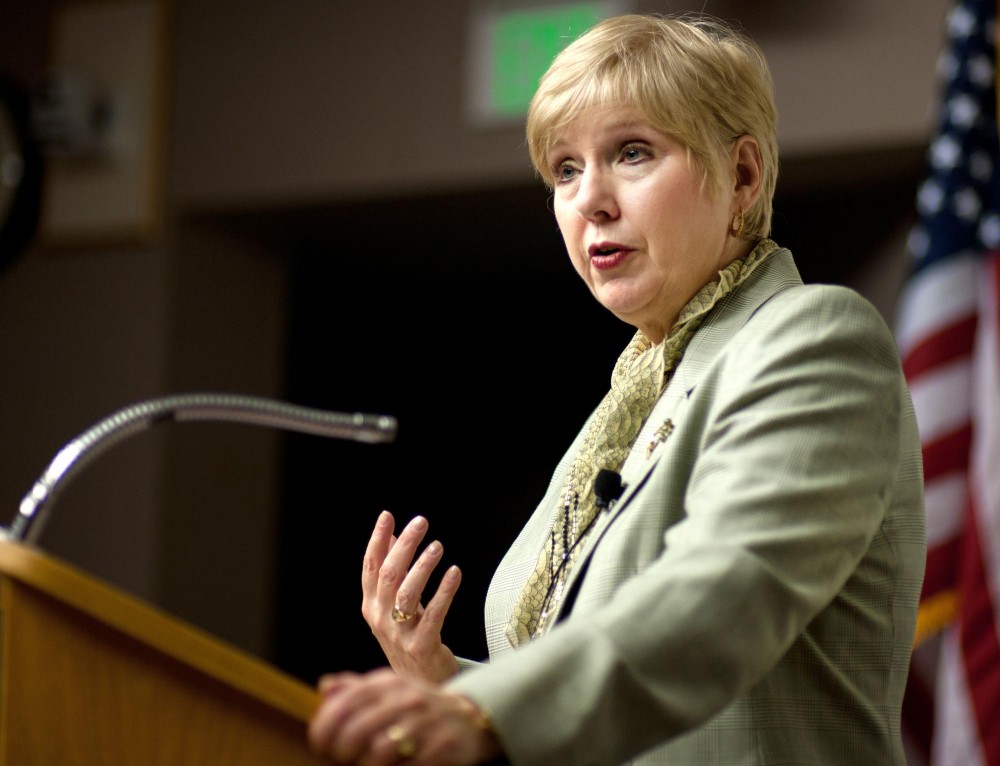University of Minnesota President Eric Kaler selected Karen Hanson on Monday to become the next senior vice president for academic affairs and provost. SheâÄôll start the job Feb. 1.
HansonâÄôs liberal arts experience will complement KalerâÄôs science background, he said in a press release. She is essentially the No. 2 at the University after Kaler, overseeing all academics.
âÄúWith Karen as provost, we get the spectacular combination of a leader with a strong academic record and someone who has honed her skills as a seasoned administrator,âÄù Kaler said in the release.
Hanson will leave her position as executive vice president of Indiana University and provost of its Bloomington campus, which she has held since 2007.
Keeping sight of academic priorities amid a constrained budget and the possibility of more state cuts will factor heavily into the next provostâÄôs term, Tom Sullivan, the current senior vice president for academic affairs and provost, said in a September interview.
She will make $390,000, a 14 percent increase from SullivanâÄôs 2009-10 salary.
Kaler chose Hanson out of a field of four final candidates, two of whom are deans within the University.
âÄúThese are exciting times for the [University], and IâÄôm thrilled to be returning to Minnesota,âÄù Hanson said in the press release. Like Kaler, Hanson will return to her alma mater âÄî she earned bachelorâÄôs degrees from the University in philosophy and mathematics in 1970.
She also received a Master of Arts and a doctorate in philosophy from Harvard University in 1980.
Sullivan will step down at the end of the year after holding the job since 2004.
Hanson joined Indiana UniversityâÄôs philosophy department as a lecturer in 1976 and became its chairwoman about 20 years later.
She has many teaching awards, fellowships and research grants to her name and has served as an adjunct faculty member in the Bloomington campusâÄôs comparative literature, American studies and gender studies departments.
âÄúCertainly serving as a faculty member gives her good experience in dealing with students and all the issues a faculty member has to deal with. I think you can see that in her leadership,âÄù said Randy Arnold, a member of the Indiana University Faculty Council. âÄúShe really values input from faculty and all other parties. SheâÄôs a very good listener.âÄù
There are nearly 9,000 more students at the UniversityâÄôs Twin Cities campus than at IndianaâÄôs flagship Bloomington campus, according to fall 2010 enrollment data. But the Indiana University system of eight campuses has about 40,000 more students than the entire University of Minnesota system.
Starting in February, Hanson will get a big raise from her last position: from $302,000 in Indiana to $390,000 in Minnesota.
Protecting the liberal arts
A general lack of support is a major concern for public higher education, Hanson said at her public forum in September.
âÄúIt is a lack of support âÄî itâÄôs not just a lack of financial support,âÄù she said, adding that rising tuition, accessibility, tenure and academic freedom have provoked public concern and criticism.
âÄúIt used to be that people thought it was expensive, but at least it was worth something,âÄù she said.
As the University guns for a spot among the top three public research universities, Hanson is worried about the humanities.
âÄúThe fact that [degrees in the humanities] donâÄôt immediately lead to a job âĦ has made people question whether or not theyâÄôre worth supporting,âÄù she said. She rejected the idea that workforce development should be the only aim of a public research institution.
With less state support and calls for administrative cuts and efficiency, Hanson has a big job ahead of her.
In 2015, she will oversee a University-wide accreditation, which will evaluate the collegesâÄô programs. But HansonâÄôs job isnâÄôt just high-level meetings and budgets, Arnold said.
âÄúShe really has a concern for the entire student experience,âÄù he said. âÄúWhat happens beyond the classroom is very important to her as well.âÄù
Hanson was one of four finalists for the position: Allen Levine, dean of the UniversityâÄôs College of Food, Agricultural and Natural Resource Sciences; Robert Elde, dean of the University College of Biological Sciences; and Gary Wihl, dean of faculty of Arts and Science at Washington University in St. Louis. A fifth finalist dropped out of the running before his or her name was released.
âÄúIn addition to her considerable administrative skills, Karen has a love of learning and of students that make her ideally suited for a role as chief academic officer for a large university,âÄù Indiana University President Michael McRobbie said in a press release.
After a year-long sabbatical, Sullivan plans to return to teaching at the Law School.
The Board of Regents will vote on whether to approve Hanson as his successor at FridayâÄôs meeting.


